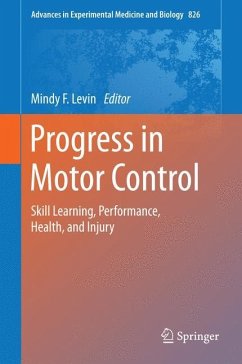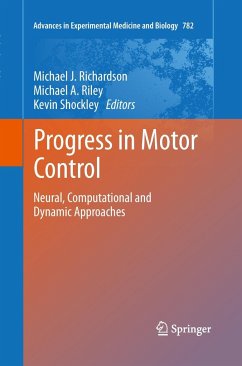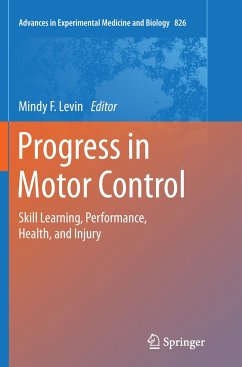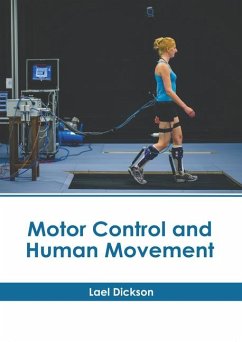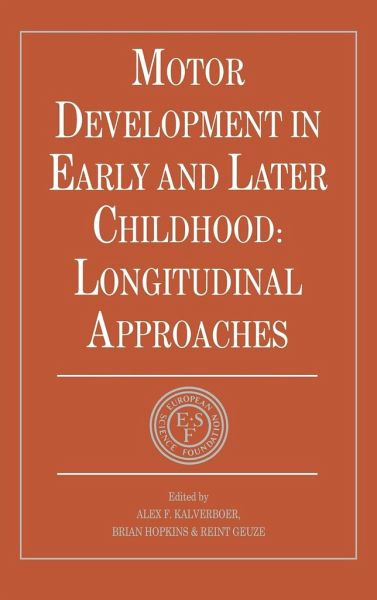
Motor Development in Early and Later Childhood
Longitudinal Approaches
Herausgeber: Kalverboer, Alex F.; Geuze, Reint; Hopkins, Brian
Versandkostenfrei!
Versandfertig in 1-2 Wochen
178,99 €
inkl. MwSt.

PAYBACK Punkte
89 °P sammeln!
Motor development is an integral part of the developmental process. Understanding the organization of the sensory-motor system and its adaptations in response to environmental factors is a vital part of understanding individual development as a whole. This volume describes and discusses human motor development using longitudinal study methods, and from an interdisciplinary perspective. Researchers from a variety of different backgrounds and disciplines provide a broad-ranging analysis of human motor development, from both the practical and theoretical standpoint, in a book which will be of gre...
Motor development is an integral part of the developmental process. Understanding the organization of the sensory-motor system and its adaptations in response to environmental factors is a vital part of understanding individual development as a whole. This volume describes and discusses human motor development using longitudinal study methods, and from an interdisciplinary perspective. Researchers from a variety of different backgrounds and disciplines provide a broad-ranging analysis of human motor development, from both the practical and theoretical standpoint, in a book which will be of great interest to paediatricians, psychologists, developmental biologists, developmental psychiatrists and neurologists as well as to research scientists in these fields.
Table of contents:
List of contributors; Foreword; Preface; Part I. Setting The Scene: 1. Motor development in children at risk: two decades of research in experimental clinical psychology A. F. Kalverboer; 2. Longitudinal studies in motor development: developmental neurological considerations B. C. L. Touwen; Part II. Biological Basis of Motor Development: 3. Principles of early motor development in the human H. F. R. Prechtl; Natural priorities for developmental study: neuroembryological perspectives of motor development R. R. Provine; 5. The 'fixed action pattern' concept revisited: an ethological commentary on the chapters by Prechtl and Provine G. P. Baerends and T. G. G. Groothuis; Part III. Development of Body Posture and Goal Directed Reaching: 6. Early postnatal development of posture control: normal and abnormal aspects M. H. Wollacott; 7. Studying the development of goal-directed behaviour C. von Hofsten; 8. Development of motor functions: a 'developmental neurological' approach P. Casaer; Part IV. Motor Development, Early Communication and Cognition: 9. Early interactional signalling: the role of facial movements H. Papousek and M. Papousek; 10. Motor development: communication and cognition G. Butterworth and F. Franco; 11. On faces and hands and the development of communication B. Hopkins; Part V. Acquisition Of Skills: 12. Individual patterns of tool use by infants K. Connolly and M. Dalgleshi; 13. Tool use, hand cooperation and the development of object manipulation in human and non-human primates J. Vauclair; 14. Handwriting: a developmental perspective G. P. Van Galen; 15. Development of children's writing performance: some educational implications N. Søvik; Part IV. Motor Development and Handicap: 16. Early motor development in term and preterm children R. H. Largo, S. Kundu and L. Thun-Hohenstein; 17. Relationship between perinatal risk factors and motor development at the ages of 5 and 9 years K. Michelsson and E. Lindahl; 18. Motor development and minor handicap S. E. Henderson; 19. Longitudinal and cross-sectional approaches in experimental studies in motor development R. H. Geuze; Part VII. Methodological and Conceptual Considerations: 20. The longitudinal study of motor development: methodological issues W. Schneider; 21. Theoretical issues in the longitudinal study of motor development B. Hopkins, P. J. Beek and A. F. Kalverboer; Epilogue: description versus explanation B. Hopkins, A. F. Kalverboer and R. H. Geuze; Index.
Motor development is an integral part of the developmental process. Understanding the organization of the sensory-motor system and its adaptations in response to environmental factors is a vital part of understanding individual development as a whole. This volume describes and discusses human motor development using longitudinal study methods, and from an interdisciplinary perspective.
Researchers from a variety of different backgrounds and disciplines provide a broad-ranging analysis of human motor development, from both a practical and theoretical perspective.
Table of contents:
List of contributors; Foreword; Preface; Part I. Setting The Scene: 1. Motor development in children at risk: two decades of research in experimental clinical psychology A. F. Kalverboer; 2. Longitudinal studies in motor development: developmental neurological considerations B. C. L. Touwen; Part II. Biological Basis of Motor Development: 3. Principles of early motor development in the human H. F. R. Prechtl; Natural priorities for developmental study: neuroembryological perspectives of motor development R. R. Provine; 5. The 'fixed action pattern' concept revisited: an ethological commentary on the chapters by Prechtl and Provine G. P. Baerends and T. G. G. Groothuis; Part III. Development of Body Posture and Goal Directed Reaching: 6. Early postnatal development of posture control: normal and abnormal aspects M. H. Wollacott; 7. Studying the development of goal-directed behaviour C. von Hofsten; 8. Development of motor functions: a 'developmental neurological' approach P. Casaer; Part IV. Motor Development, Early Communication and Cognition: 9. Early interactional signalling: the role of facial movements H. Papousek and M. Papousek; 10. Motor development: communication and cognition G. Butterworth and F. Franco; 11. On faces and hands and the development of communication B. Hopkins; Part V. Acquisition Of Skills: 12. Individual patterns of tool use by infants K. Connolly and M. Dalgleshi; 13. Tool use, hand cooperation and the development of object manipulation in human and non-human primates J. Vauclair; 14. Handwriting: a developmental perspective G. P. Van Galen; 15. Development of children's writing performance: some educational implications N. Søvik; Part IV. Motor Development and Handicap: 16. Early motor development in term and preterm children R. H. Largo, S. Kundu and L. Thun-Hohenstein; 17. Relationship between perinatal risk factors and motor development at the ages of 5 and 9 years K. Michelsson and E. Lindahl; 18. Motor development and minor handicap S. E. Henderson; 19. Longitudinal and cross-sectional approaches in experimental studies in motor development R. H. Geuze; Part VII. Methodological and Conceptual Considerations: 20. The longitudinal study of motor development: methodological issues W. Schneider; 21. Theoretical issues in the longitudinal study of motor development B. Hopkins, P. J. Beek and A. F. Kalverboer; Epilogue: description versus explanation B. Hopkins, A. F. Kalverboer and R. H. Geuze; Index.
Motor development is an integral part of the developmental process. Understanding the organization of the sensory-motor system and its adaptations in response to environmental factors is a vital part of understanding individual development as a whole. This volume describes and discusses human motor development using longitudinal study methods, and from an interdisciplinary perspective.
Researchers from a variety of different backgrounds and disciplines provide a broad-ranging analysis of human motor development, from both a practical and theoretical perspective.






